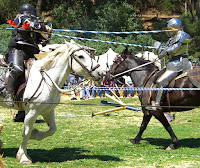Sean and I met for coffee and a chat, we talked about life and some people we feel led to spend a little time with. Then we prayed briefly and devoted the rest of the evening to reading Galatians 1 and discussing our thoughts about it. Some of my main impressions follow.
Paul sets out, right at the beginning, by stating clearly that he was not sent from or by any man, but by Yahshua the Messiah and by the Father who raised him from the dead. And as usual, the letter is not just from Paul but also from the the other believers who are with him.
In verses 3-5 he provides a miniature recap of the gospel message, wrapped up in just a brief sentence. It's as if he wants to remind the Galatians right from the start that they're here by grace alone, rescued by Christ.
He writes that he is 'astonished' that they are already turning to a different 'gospel'. They've been confused by wrong teaching. Paul doesn't want them to remain confused so he explains in verse 11 that he didn't just make it all up, nor was he taught it by others, but he received it as a revelation from the Messiah.
Thinking about this it seems extraordinary that this Paul, this persecutor of the church, should have had such a powerful experience on the Damascus road that he has turned from his previous passion (legalistic Judaism) and has moved to something completely different. And of course it
is extraordinary but we often miss the contrast because we are so familiar with Paul's letters that we forget how much he had changed.
It would be a complete and unexpected transformation, a little like the present Chief Rabbi suddenly having a revelation about Yahshua and, without hearing it from other people first, beginning to teach this new way. We expect that every kind of knowledge must be imparted by logical persuasion and by eloquent argument. Not so!
And Paul gives them the full story, perhaps to back up his earlier claim that he received his revelation direct from Yahshua, not by teaching from the Jerusalem church. It's a story that continues into chapter 2.
We thought how the truth comes from the source, who is Christ. Yes, it also comes through the Bible, but the Bible is not the source any more than the apostles in Jerusalem were the source. They (and Paul) wrote the New Testament so the revelation they received from Yahshua that enabled them to write must itself be more fundamental than the words they wrote.
The Bible matters to us and is important because it is our source of information about Jesus and the early church. We dare not ignore it. But knowing Jesus personally is much more important than knowing the writings about him. Walking with him daily is more important than reading the New Testament daily. Hearing and obeying him is more fundamental to our lives than following even the best traditions and habits. Everything we can plan and do is dead works, we must 'seek first the Kingdom' trusting that everything we need (including guidance) will be added in as part of the package!
 We met at our house, Donna and me, Jim, Pam, Sean, and Joe. Sean had prepared some sushi (fish free as he knew I wouldn't have liked that). Pam's reaction when we talked about it showed that she didn't much like the sound of raw fish either! We followed it with jacket potatoes, vegetable chilli, beef chilli, and salad. Jim had brought an amazing pear and chocolate dessert.
We met at our house, Donna and me, Jim, Pam, Sean, and Joe. Sean had prepared some sushi (fish free as he knew I wouldn't have liked that). Pam's reaction when we talked about it showed that she didn't much like the sound of raw fish either! We followed it with jacket potatoes, vegetable chilli, beef chilli, and salad. Jim had brought an amazing pear and chocolate dessert.





